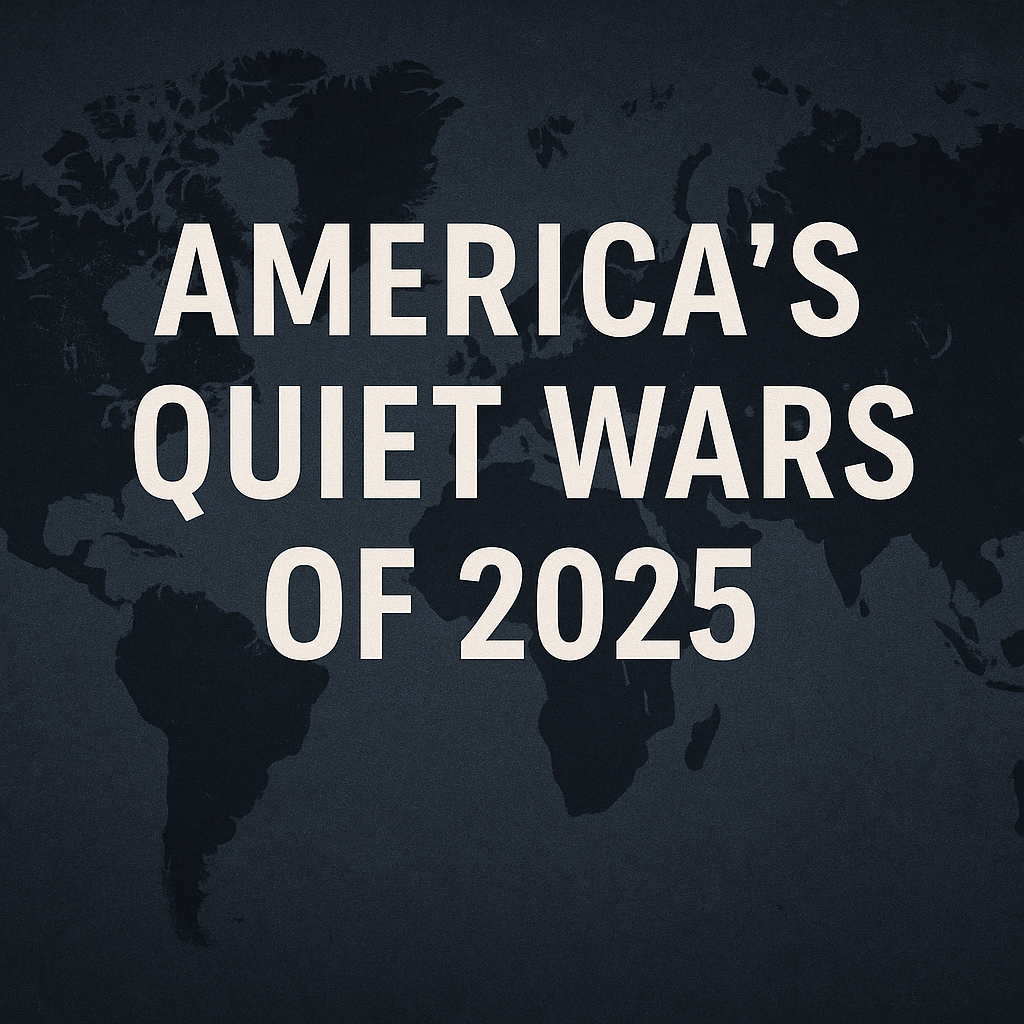America’s Quiet Wars of 2025

3 Key Takeaways
- U.S. warships off Venezuela target cartels, not Caracas—yet regional alliances amplify pressure.
- In Mexico, cartel wars have turned into open political conflict in the Senate.
- Global rivals frame U.S. deployments as imperial overstretch, but allies quietly back them.
Intro
The United States is not at peace. It is managing wars—quietly, strategically, and everywhere. From the Caribbean to the Red Sea, Washington projects power not to conquer territory, but to control flows: of drugs, oil, money, and influence.
Venezuela: Warships and Regional Endorsements
At the end of August, the U.S. Navy deployed three Aegis destroyers, a nuclear submarine, and nearly 4,500 troops to the Southern Caribbean. Officially, the mission is framed as an anti-cartel campaign against groups like Tren de Aragua and the Sinaloa Cartel, now designated as terrorist organizations.
But no one in Caracas mistakes the signal. Nicolás Maduro responded by mobilizing 15,000 troops on Venezuela’s western border, strengthening coastal defenses, and parading volunteer militias in Caracas. For a regime built on survival, the symbolism of U.S. firepower so close to Venezuelan shores is more threatening than the official rhetoric of “anti-narco” policing.
What matters most is who stands with Washington. Trinidad and Tobago, along with several Caribbean states, has publicly backed the U.S. deployment. For small island nations vulnerable to cartel smuggling routes, alignment with Washington is both pragmatic and symbolic. Their support reinforces the message that Venezuela is isolated not just by the United States, but by its own neighbors.
This isn’t about eradicating cartels. It’s about projecting pressure onto a government that has long blurred the lines between politics, crime, and survival. Venezuela remains a narco-state in everything but name. The U.S. isn’t invading—it’s squeezing.
Mexico: Cartels at the Core
In Mexico, the same anti-cartel doctrine has sparked chaos not just on the streets, but in Congress. Late August saw a dramatic brawl in the Senate—lawmakers trading punches after a debate on whether Mexico should allow, or even tacitly accept, U.S. military action against cartels.
President Claudia Sheinbaum has drawn a red line: no foreign troops on Mexican soil. Yet the clash in the legislature shows how deeply divided Mexico’s political class has become. For some, U.S. pressure is a necessary evil against cartels that threaten national stability. For others, it is a sovereignty crisis in the making.
The irony is that, even as the rhetoric escalates, American surveillance drones, intelligence networks, and special operations already blur the boundary. For Washington, Mexico is too close to ignore. For Mexico, sovereignty is too fragile to concede. That contradiction guarantees more friction—and more political theatre.
Middle East: Commerce, Not Crusade
The U.S. is also fighting on another front—this time for global commerce. Operation Prosperity Guardian, a multinational naval task force, continues to defend Red Sea shipping lanes from Houthi missile and drone attacks. Earlier this year, Operation Rough Rider saw U.S. and British airstrikes across Yemen until a ceasefire was brokered in May.
The driver is simple: oil flows, global trade, insurance costs. Washington’s mission is not ideological—it is logistical. Protecting cargo ships from Suez to Rotterdam is about defending the arteries of globalization. In 2025, the U.S. Navy is less a crusader than a lifeline.
Somalia: The Drone War That Never Ends
Far from the cameras, America’s drone war continues. In Puntland, U.S. airstrikes killed an ISIS recruiter and financier in the Cal Miskaad mountains earlier this year. Strikes near Kismayo targeted al-Shabaab camps, keeping militant groups from regrouping.
The scale is small, but the persistence is telling. For nearly two decades, Somalia has been a proving ground for U.S. counterterrorism doctrine: minimal footprint, maximum precision, no exit. Washington doesn’t win, but it doesn’t leave either.
Haiti: Outsourcing Intervention
In the Caribbean, the U.S. is trying a different model. Rather than lead, it is backing a UN-authorized Gang Suppression Force led by Kenya and supported by Panama. American drones, logistics, and transport underpin the mission, but the U.S. insists it is not the face of intervention.
This is power by proxy. It spares Washington the political cost of another occupation, while ensuring the hemisphere’s most fragile state doesn’t collapse entirely. Haiti’s gangs are localized, but the instability radiates outward—to Florida, to migration routes, to regional trade.
Global Reactions: Allies, Rivals, and Silence
Every deployment is also a message to rivals. Russia and China have framed the U.S. moves in Venezuela as imperial “gunboat diplomacy,” amplifying Maduro’s narrative that Washington seeks regime change. Moscow, still tied down in Ukraine, has little capacity to intervene beyond rhetoric. Beijing, dependent on Venezuelan oil and Latin American markets, has issued cautious condemnations while quietly hedging.
Europe, in contrast, has largely supported U.S. moves in the Middle East, recognizing that Houthi attacks on shipping destabilize not just oil prices but also insurance markets critical to EU economies. In the Americas, Caribbean allies like Trinidad and Tobago have given Washington diplomatic cover, while Brazil and Mexico tread carefully, wary of appearing aligned with U.S. hard power.
The pattern is clear: allies see stability, rivals see overreach, and most countries prefer silence—because silence costs less than alignment.
Why It Matters
These interventions share a pattern: they are not wars of conquest. They are wars of management. The United States is less focused on planting flags than on shaping flows—drugs, oil, commerce, migration.
- In Venezuela, U.S. warships broadcast pressure on a narco-state, amplified by Caribbean allies.
- In Mexico, cartel violence has spilled into the Senate, turning security into open politics.
- In the Middle East, U.S. destroyers guard global shipping lanes, keeping trade predictable.
- In Africa and Haiti, drones and proxies hold back chaos at minimal cost.
- Globally, rivals denounce and allies hedge, but U.S. power still sets the terms.
Markets are not just numbers—they are power. Military deployments ripple across oil prices, shipping insurance, currency markets, and foreign investment. The real battlefield is not terrain—it is stability.
Closer
The noise hides the signal: America is fighting wars not to win them, but to shape the world they unfold in. Military might is no longer the message—it is the messenger.





